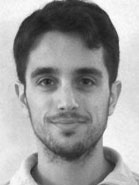|
 Filippo Botta Filippo Botta
A thesis for the degree of Doctor of Philosophy defended June 2019.
The PhD School of Science, Faculty of Science, Centre for Ice and Climate, Niels Bohr Institute, University of Copenhagen
Supervisors:
Anders Svensson, David Nogués-Bravo, Dorthe Dahl-Jensen, Carsten Rahbek
|
The ecology of abrupt climate changes during the last glacial period
First and foremost I would like to thank my supervisors Anders Svensson, David Nogués-Bravo, Dorthe Dahl-Jensen and Carsten Rahbek, for their kind advice, their reliable guidance, and all the help they granted throughout the progress of the research. I am grateful for their interest and commitment in the project, and for their contagious enthusiasm.
This research is the result of a collaboration between the Centre of Ice and Climate and the Center for Macroecology, Evolution and Climate. Working in such distinguished centres of research was a honour. I owe my gratitude to all the colleagues at CIC and CMEC, for letting me share with them such a cosy and at the same time inspiring workplace. A special thanks goes to my office mates Alexander Flórez Rodríguez, Konstantinos Giampoudakis and Jesper Sonne, whose pleasant company and friendly conversations provided an invaluable help to keeping up the spirit.
This project gave me the extraordinary opportunity to come in contact with exceptional researchers. Many thanks go to Robert K. Colwell, John W. Williams and Damien Fordham, for the time and interest they dedicated to this project, and for their precious feedback. I also want to thank Spyros Theodoridis, Michael Krabbe Borregaard and Julia Pilowsky for their help with the difficult task of coding the software. A very fruitful collaboration arose during the abroad period as guest researcher by the Universidade Federal de Goiânia.
My gratitude goes to Thiago F. Rangel for inviting me, and for the time he dedicated to work on the project. Many thanks also to all the colleagues of the Laboratório de Ecologia Teórica e Síntese, for the welcoming work environment during my period of permanence. Lastly, I would like to express my gratitude to my family, who backed me up during the making of this thesis. Above all, my warmest thanks to Lærke, who patiently supported me the whole time, making all of this possible.
|